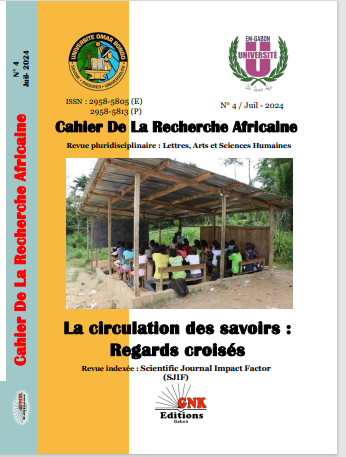- Aujourd'hui: 30/10/2024
-
MARIAGES EXOLINGUES ET PERDITION DES LANGUES LOCALES GABONAISES : APPROCHE SOCIOLINGUISTIQUE
Résumé : Le Gabon, à l’instar de beaucoup d’autres pays africains, hérite du français comme langue officielle et administrative, tel que consigné dans la Constitution du pays. Elle interagit avec de nombreuses langues locales essentiellement bantoues. Aussi, toute cohabitation linguistique, selon certains sociolinguistes comme Louis Jean Calvet (1979), génère divers phénomènes linguistiques et sociolinguistiques, comme le bilinguisme, l’hybridation, la glottophagie, etc. Ce dernier phénomène est celui qui commande la présente contribution. La langue française s’est établie au Gabon comme « langue d’échange inter et extracommunautaire », faute de langue nationale. A cet effet, la problématique de la sauvegarde des langues maternelles devient un défi majeur, au point de questionner un des mécanismes qui participerait lentement à « la mort de ces idiomes locaux », au sens où l’entendrait Claude Hagège (2000). L’union de deux individus dans un mariage mixte ou encore interethnique ne tient généralement pas compte de la donne linguistique. Les familles exolingues sont le plus souvent confrontées à l’incommunication. Bien que bantoues, certaines langues présentent un degré d’intercompréhension nul. La communication étant « un besoin primaire », la langue française devient dès lors, le recours approprié. Cette situation aurait pour conséquence, la perdition des langues maternelles et la difficile transmission intergénérationnelle de ces dernières. Il s’agit donc dans le présent article, de questionner un échantillon de familles exolingues pour déduire d’un potentiel impact de la langue française, nocif à la survie des langues locales.
Abstract: Gabon, like many other african countries, inherits french as its official and administrative language, as enshrined in the country’s constitution. It interacts with many local languages, mainly Bantu. Also any linguistic cohabitation, according to certain sociolinguists like Louis Jean Calvet, generates various linguistic and sociolinguistic phenomena such as bilingualism, hybridization, glottophagy etc. This last phenomenon is the one which governs the present contribution. The french language has established itself in Gabon as a language of inter and extra-comunity exchange, due to the lack of a national language. To this end, the problem of safeguarding mother tongues becomes a major challenge, to the point of questioning one of the mechanisms which would slowly copntribute to the death of these local idioms, in the sense that Claude Hagege would understand it. The union of two individuals in a mixed or even inter-ethnic marriage does not generally take linguistic factors into account. Exolingual families are most often confronted whith intercomunication. Although bantou, certain languages have a zero degree of intercomprehension. Communication being a primary need. The french language therefore becomes the appropiate recourse. This situation would result in the loss of mother toungues and the difficult intergenerational transmission of them. Its therefore a question in this article of questioning a sample of exolingual families to deduce a potential impact of the french language, harmful to the survival of local languages
-


